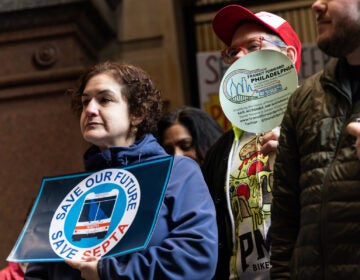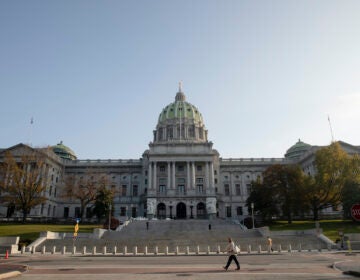Philly-area Republicans present a plan to increase SEPTA accountability, but provide no financial support
As SEPTA service cuts loom, Republican state senators lay out a transit transparency bill that offers oversight, but not funding.

Public transit supporters rallied for SEPTA outside their headquarters on Market Street on May 19, 2025. (Kimberly Paynter/WHYY)
From Philly and the Pa. suburbs to South Jersey and Delaware, what would you like WHYY News to cover? Let us know!
Republican state senators from the Philadelphia area introduced legislation last month to increase accountability for SEPTA, as the cash-strapped transit system faces major service cuts amid prolonged state budget negotiations.
The legislation, proposed by state Sen. Joe Picozzi, R-Philadelphia, would require SEPTA to release biennial performance reports detailing its progress toward financial stability and its use of state funding. It would also mandate the state to set “minimum system performance criteria” aimed at addressing fare evasion, enhancing public-private partnerships and optimizing bus routes. If SEPTA fails to meet these benchmarks, it would be placed under a state-mandated improvement plan.
SEPTA General Manager Scott Sauer worked with Picozzi to draft the bill.
“We had a lot of long conversations, I mean, heart-to-hearts, about what SEPTA can and should be, and what the system looks like when it’s used to its highest, most beautiful purpose,” Picozzi said. “I think our hearts are in the same place.”
Pennsylvania’s budget includes $293 million earmarked by Gov. Josh Shapiro for transportation improvements — a sum that could play a crucial role in reducing SEPTA’s $213 million deficit, which is set to trigger nearly 50% service cuts starting Aug. 24.
When asked if he thought his bill could be a precondition to future SEPTA funding, Picozzi said it was “part of the conversation.”
“I’m calling for things that SEPTA wants to do already,” Picozzi said. “As much as I’m willing to shake their hand and say, ‘I believe you,’ the public needs to make sure that they’re accountable and deliver on those things, particularly safety, cleanliness, crackdown on fare evasion and more efficient use of dollars.”
“A lot of senators have raised questions, ‘What’s the money being spent on? Is it efficient?’I certainly think that this kind of legislation can help move things along,” said Picozzi.
Sen. Frank Farry, R-Bucks, and Sen. Tracy Pennycuick, R-Montgomery, are co-sponsoring the bill. WHYY News reached out to both senators for a statement and did not hear back prior to publication.
The trio of senators remains gridlocked on negotiations for the overdue state’s budget, which had a June 30 deadline.
SEPTA believes bill could provide reassurance to state Senate
While the proposal does not provide the struggling system with any new funding, SEPTA is hopeful it will give lawmakers in Harrisburg some “extra assurance” while they continue to deliberate the budget.
“The state is the primary funder of SEPTA, so any additional oversight that they want to bring, we think it’s good for everyone,” said SEPTA spokesperson Andrew Busch.
A large part of SEPTA’s support may be due to what Busch said would be the ease in complying with the bill’s requests.
“These are largely things that we already are doing regularly as part of our operation, and you know how SEPTA is run,” he said. “So I don’t think we would be taking on any additional costs or anything to be able to comply with this.”
Beyond regular communication with state and local authorities, SEPTA’s Efficiency & Accountability Program internally evaluates SEPTA’s safety and efficiency and implements initiatives to improve the authority.
The first set of 140 E&A initiatives saved SEPTA $91.4 million in total during their runtime from 2022 to 2025, according to SEPTA. Its next batch of 76 initiatives is projected to save $76 million from 2025 to 2027.
With the legislation only furthering prior initiatives, Busch hopes SEPTA’s support of the bill provides some ease, not only for the General Assembly, but also concerned riders.
“We get a great deal of funding from the state, and we want to be as forthcoming as possible in showing how we’re using that and how it’s benefiting our customers,” Busch said. “We hope that SEPTA’s embrace of the legislation gives an added sense of transparency from us to our customers.”
Transit advocates at odds with bill in continued funding push
Despite SEPTA’s support, transit advocates perceive the bill’s filing as a delay in SEPTA securing much-needed funding.
“We support initiatives to improve safety and reliability on the system, but the best way to do that is to invest in a system that runs efficiently,” said Stephen Bronskill, coalition manager for Transit Forward Philadelphia.
Bronskill’s organization is a coalition of Philadelphia-based organizations pushing to improve public transit. Within the 37-organization coalition is the SEPTA Citizens Advisory Committee, the Philly Transit Riders Union and the SEPTA Youth Advisory Council, among others. The coalition believes the bill accomplishes something already happening.
“The first thing is that funding, messaging and bills can come later,” Bronskill said. “SEPTA is already doing many of the things outlined in this bill.”
As the Aug. 24 date for SEPTA cutbacks is now just weeks away, Bronskill hopes Picozzi and the rest of the Pennsylvania Senate will return to state budget negotiations that were deadlined to end on June 30.
“They should listen to their constituents,” said Bronskill. “They feel scared, they feel frustrated, they feel concerned right now, and they worry about what’s gonna happen. I think this is a bipartisan issue. We need to be funding transit, and we need to do it quickly.”

Get daily updates from WHYY News!
WHYY is your source for fact-based, in-depth journalism and information. As a nonprofit organization, we rely on financial support from readers like you. Please give today.





